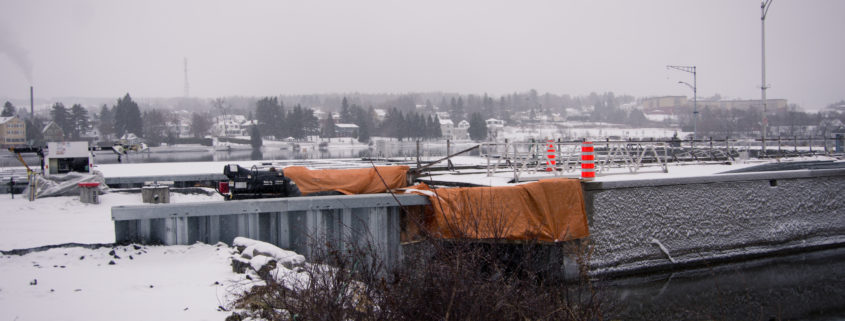The tragedy of Lac-Mégantic is not over
At the time of this writing, an oil-filled wagon train can still be parked up the coast in Nantes, the coast where the train is gone, slope considered particularly steep in the railway environment. The regulations permit. As it allowed the company to run the train with one employee.
Furthermore, we still don't have a bypass, although the federal government has committed to building one before his election. The trial of MMA employees brought the matter to the fore and the government finally relaunched its project, after a long silence. Let's say it was time!
As you understand, trains still run right through the city center. A desert city center with just a few new modern buildings, far from the sometimes centenary architecture of the old city center, which was still standing after the derailment. Only the ugliest building remains, that of the communication company, a company that has a lot of money. The old inn with a splendid architecture which had just enlarged the year before the derailment and which had hosted my first evenings in a bar with my friends is no longer. He had survived the disaster and was even further away than the communications company building. It was nevertheless demolished, like the rest of the city center. This city center should not have been demolished after the derailment, not at this point. We don't know exactly what happened with the city. We did not know what would happen with the land of our family home burned for more than a year because of the confusion with the city.
That’s how we ended up with a new city center right next to ground zero, a mini dix30 as it is not affectionately called at all in the region. We don't really know where it comes from as a shitty idea. Hello citizen discussion eh! Speaking of citizens, the latter did not wait for any authorization to organize. We will think of the Coalition of citizens and organizations committed to railway safety in Lac-Mégantic which, since its creation, has demanded a bypass and a commission of inquiry. We will think of this engineer, Mr. Bellefleur who went himself to inspect the railroad tracks in the vicinity of the city and was tapped on the fingers by the order of engineers for wanting to learn more and to expose his discoveries on rail safety more that failing in her own community.
The Lac-Mégantic tragedy is therefore not over. It continued long after the derailment, during the destruction of our city center, left in the hands of contractors rather than those of the general public. She continued with the suicide of this young firefighter from 25 years old who had discovered the body of his girlfriend in the rubble. It continues with the train derailment in Hochelaga in the fall 2015 and the one in downtown Sherbrooke in the spring 2017. At least, these trains did not explode.
It is the tragedy of a society and its economic model that puts quantity before quality. An economic model serving the whims of the big bosses of finance and fossil fuels to the detriment of the population. We are not fools, we know that the real leaders are at the top of the companies and in government too soft with these. Things would be different if employees had a say in safety rules. But when are employees listened to by their employer?
Indeed, what would be the first reflex of a business managed directly by members of the community? By the people who work in it, know how to build, know their machinery, invest their workplaces and above all, are most likely to know how to give meaning to this work done? I frankly doubt that it would be to think of how to hide the profit of their company in tax havens in order to avoid the taxes, that it must be said, fund our schools, our hospitals, our public services and the social safety net. I doubt it would be to make the cheapest viaducts that fall on us. I doubt that it is to maintain our dependence on fossil fuels that endanger our lifestyles and places.
Non, maybe i'm naive, but I think the first reflexes would be to think how to be the most useful to society by meeting its needs. It would be to create efficient infrastructure, thought to be used by one's own community and oneself therefore goodbye the cheap. It would be like thinking how not to pass trains filled with dangerous products in the middle of residential areas.
Who is afraid to democratize their workplace and their neighborhood? And especially, who is afraid that we will take over the wage-earning world as workers?
Solidarity,
X385020
Photo credit: photo of the author









Leave a Reply
Want to join the discussion?Feel free to contribute!